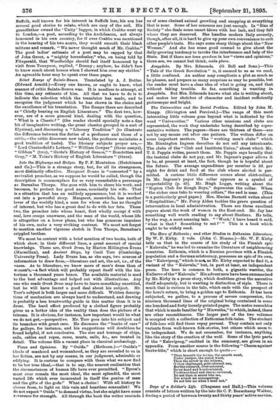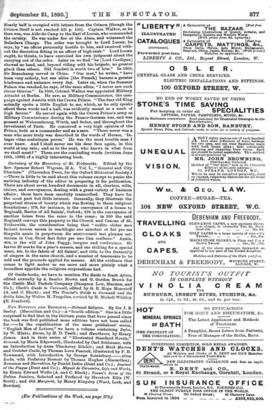Days of a Soldier's Life. (Chapman and Hall.)—This volume consists
of letters written by the late Sir C. P. Beauchamp Walker, during a period of between twenty and thirty years' active service. Nearly half is occupied with letters from the Crimea (though the Crimea itself is not reached till p. 103). Captain Walker, as he then was, was Aide-de-Camp to the Earl of Lucan, who commanded the cavalry. He was under fire at the Alma, and witnessed the Balaclava Charge. The order was brought to Lord Lucan, he says, by "an officer personally hostile to him, and received with- out the discretion fitting in an officer of high rank." Lord Lucan ought, he thinks, to have exercised his own judgment about the carrying out of the order. Later on we find "he [Lord Cardigan] showed no head, and, beyond riding with his brigade, no greater pluck than others. Old Scarlett is worth two of him." In 1860, Sir Beauchamp served in China. "Our men," he writes, "have been very orderly, but our allies [the French] became a greater hindrance and nuisance every day. Later on, when the Summer Palace was reached, he says, of the same allies, "I never saw such clever thieves." In 1865, Colonel Walker was appointed Military Attaché at Berlin. He saw, as Military Commissioner, the cam- paign against Austria with the Crown Prince. "The dear old King actually spoke a little English to me, which, as he only speaks about three words and a half, was evidently meant as a mark of high favour." He served again with the Crown Prince's army as Military Commissioner during the Franco-German war, and was present at Weissembourg, Worth, and Sedan, and throughout the investment of Paris. He conceived a very high opinion of the Prince, both as a commander and as a man. "There never was a man who more truly was described in the words of Horace, • In- teger vitae scelerisque pumas.' He was the most lovable man I ever knew. And I shall never see his dear face again, in this world at any rate ; and as to the next, who knows in what form we shall meet P" These are the concluding words (written June 10th, 1888) of a highly interesting book.



































 Previous page
Previous page